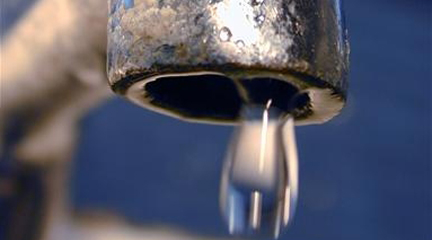HOUSTON Radiation has contaminated the underground pipes, water tanks, and plumbing that provide drinking water for much of Central Texas and the famed Texas Hill Country, according to concerned city officials in the region who have tested the pipes with Geiger counters.
According to local officials, the contamination comes from years of exposure to drinking water that already tests over federal legal limits for radioactive radium. Of even more concern, they say, is that any water quality testing is done before the water runs through the contaminated pipes that could be adding even more radiation.
It s a serious concern, City of Brady Manager James Minor said. These pipes have so much radioactivity in them, metal recycling places refer to them as they re hot.
Minor said the city made the discovery when it recently dug up older steel water pipes from the ground in an attempt to replace them. When the city brought the older pipes to a local recycling scrap yard, the scrap yard turned them away as too radioactive to recycle.
It just brings lots of questions to my mind as far as, what s that doing to the people drinking it, he said, referring to the water that flows through the pipes.
Minor said he is speaking out in an attempt to do the right thing on behalf of his citizens, and those who live in the region.
This is a regional problem for 40 to 50 other communities, he said. This is a huge problem. We just happen to be the one standing here in front of the camera talking about it.
City of Brady officials spoke openly about the issue after being contacted by KHOU 11 News. The call was prompted by internal documents from the Texas Commission on Environmental Quality, which identified a main source of the region s water as radium contaminated. The TCEQ had initially refused to release the paper after a public-records request, and only did so under order from the Attorney General of Texas.
The white paper, titled Implementing the National Primary Drinking Water Regulations for Radionuclides, was an internal assessment of the threat posed from radiation in Texas water, and was prompted by new federal regulations the Environmental Protection Agency adopted on Dec. 7, 2000. The Texas report states over 200,000 Texans drink water from public water systems which are contaminated with relatively high levels of radium and other naturally occurring radioactive material.
The state paper names the Hickory Aquifer as one of the most contaminated in Texas, and says, without a feasible means to treat the drinking water and manage the residuals, the Hickory Aquifer would become unusable as a public drinking water source.
The Hickory Aquifer is the main water source for much of the Texas Hill Country and communities in central Texas that depend on groundwater.
The paper, dated in 2001 but worked on through 2004 according to other TCEQ documents, says some of the affected water systems in Texas contain water so contaminated that it that would produce an additional cancer for every 400 persons. Federal regulations allow for cancer risks to be no more than an additional cancer for every 10,000 persons.
It concludes by saying, The staff of Public Drinking Water, Underground Injection Control and Radioactive Waste, Toxicology and Risk Assessment, and Legal have reviewed this issue. They have determined that there is a human health concern associated with radionuclides in some drinking water systems in Texas.
Ralph Carlisle, the manager of a regional scrap yard called Brady Recycling, says he doesn t have to read the white paper to know just how serious a risk the water poses. Carlisle keeps a Geiger counter on hand to protect his business from contaminated metals. He says 3 out of 4 water tanks, pipes, or other metal exposed to Hill Country drinking water are too radioactive for him to accept.
He tests the metal with a Geiger counter to prevent fines from plants he contracts with to melt the metals down. Carlisle says if he sends out metals that test positive for radiation contamination, the fines are steep.
Sales of bottled water are what we d want to invest in around here, he said. Get a stock market and you d make a killing.
Carlisle says that he does not allow his employees or family to drink the area tap water, because of what he sees every day on the job, and remains concerned about the impact on children in the area.
A child you can tell 40 times a day not to drink that water, and he ll (still) do it, he said. Adults, we know: drink at your own risk.
Public health scientists Dr. David Ozonoff, of Boston University, and Dr. Joshua Hamilton have previously told KHOU11 News that most dangers from radium in drinking water do not come from physical contact with it, but rather, from the ingestion of the radionuclides into the body.
Carlisle uses a Geiger counter that only documents radiation that is concentrated enough to produce an energy that travels through the air. He does not test the inside of the water pipes for radiation, to test the area where drinking water flows directly through on its way to area homes.
I m sure every region has got its own, you know, certain things they check more. Ours tends to be water and old pipe which could have been used for water, he said.
He suspects that radium, which naturally seeks calcium, is accumulating on the inside of the area s steel water pipes in areas where there is calcium building up.
You think of the things that made it radioactive, and it s probably years of somebody drinking that water, he said.
Carlisle says water tanks from people with private wells in the region, which are not required to be tested for radiation contamination in their water, have the same problems and mostly have to be rejected as well. He says he s seen the problems from public and private tanks ranging from just north of Fredericksburg to near Junction.
KHOU: More often than not, most water tanks in this region, you literally can t accept?
Carlisle: I can t.
KHOU: Too much radiation?
Carlisle: Too much radiation.
KHOU: So much that you as a recycling business will have to turn away the business?
Carlisle: I have to turn away the business...I can t accept it; there is no one who can.
State tests of drinking water from regional public-water systems that take water from the Hickory reveal nearly every community is in violation of federal EPA limits for radium. The limit is set at 5 picocuries per liter of a combination of two types of radium. The City of Brady has individual wells that have tested three times above that limit. Nearby North San Saba has tested more than four times the EPA limit for radium. The public water system for Millersview has wells that have tested 11 times the limit for radium.
Of important note: the North San Saba water district provides water from a different water supply that feeds portions of San Saba county, while the City of San Saba provides water to city residents.The city of San Saba is not in any way in violation of EPA accepted levels of radium and is currently seeking a superior water quality rating with TCEQ.
Devane Clark, a radiation specialist with TCEQ s radioactive materials division, said the TCEQ had heard of similar radioactive pipes being created from oil and gas drilling in the state. However, he said state regulators were previously unaware it could also take place from exposure to drinking water.
Clark reviewed video of the measurements taken from the Brady Recycling yard and said, This would be cause for concern, yes.
When told that people in the region are concerned about drinking water from the pipes, Clark said, I understand their concern and I think it should be studied more.
Clark said that in the oil and gas industry, a similar radioactive pipe scale would not easily come loose from sticking to the inside of the pipe itself to get into the water people actually consume.
When presented with a photograph of the rusted condition of Brady s current underground water pipes, Clark agreed those pipes in particular did not appear to be of a solid or stable nature, and suggested anyone who has concerns about drinking radioactive materials should install a point of use water filter such as a reverse-osmosis system in their home.
KHOU 11 News also spoke with Elston Johnson, who manages the public drinking water division of the TCEQ.
During an on-camera interview, Johnson said, he too, had never heard of radioactive water pipes until now.
Well, we need to look into it. This is the first I ve heard of it, he said.
When asked why the state had not done more to investigate the region s contamination problems, considering the state s own scientists documented the threat in detail, Johnson claimed to have never seen the white paper.
KHOU: This white paper says (for) communities taking water out of the Hickory aquifer, without filtering it for radiation, the drinking water would be unusable (if it came) out of the Hickory.
JOHNSON: OK I m not familiar with that, so...
KHOU: But I sent this ahead of time. Long before I m sitting here today.
JOHNSON: OK.
KHOU: Have you not reviewed this paper?
JOHNSON: I don t know what you re talking about, haven t seen it.
In fact, after the interview, KHOU uncovered a letter that Johnson personally signed just last year where he was forwarding the very same white paper for outside review to the Texas Radiation Advisory Board, along with four top drinking water and radiation specialists internal to TCEQ.
KHOU 11 News attempts over the last several weeks to follow up on the discrepancy with Johnson and TCEQ officials have gone unanswered.
That said, City of Brady Manager James Minor says that officials from TCEQ have recently been out to visit the region and independently documented the same radiological problems with their own Geiger counter.
Minor says that he is not personally interested in looking back or asking questions about why more was not done sooner, but wants help for his citizens and neighbors in the region. Minor says the city s entire underground system of steel pipes likely needs to be replaced with something that is not metal.
He said the pipes he brought out of the ground to show KHOU had only been in the ground for four or five years. Minor says the vast majority of the city s distribution pipes have been there for 30 to 40 years.
For a community of this size, with the financial problems we have that s a real burden. So I m looking for other areas of funding, he said.
The TCEQ s Devane Clark notes that typically a Geiger counter is not sensitive enough to pick up radiation from drinking water itself, even if the water contains enough radiation to exceed the federal legal limit by several times.
Typically, state or federal labs use much more sensitive detection instruments than a Geiger counter to find radionuclides that may be present in America s water supply. For that reason, Clark notes, for a Geiger counter to be able to detect the radiation in the pipes, he believes it must be building up in amounts hundreds, or even thousands of times the federal legal limit for drinking water that is consumed regularly. Clark said the amounts are still well below what is found in oil and gas wells.
To view extended clips of the Geiger counter readings from various types of metal in Central Texas and the Hill Country, just click on the related links attached to this story.


